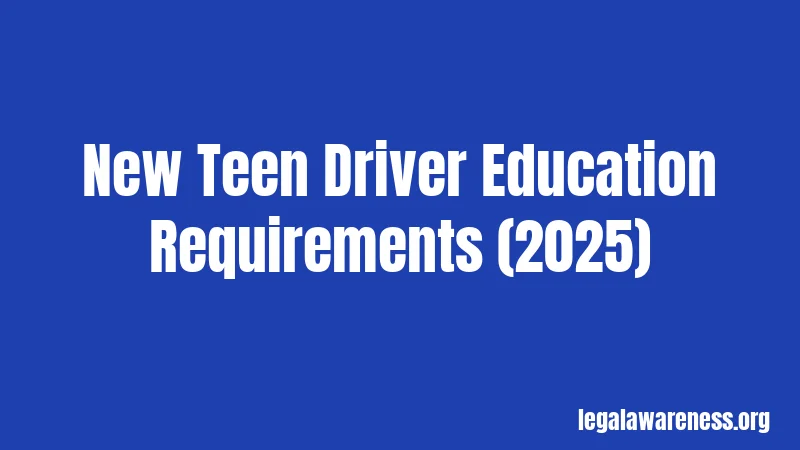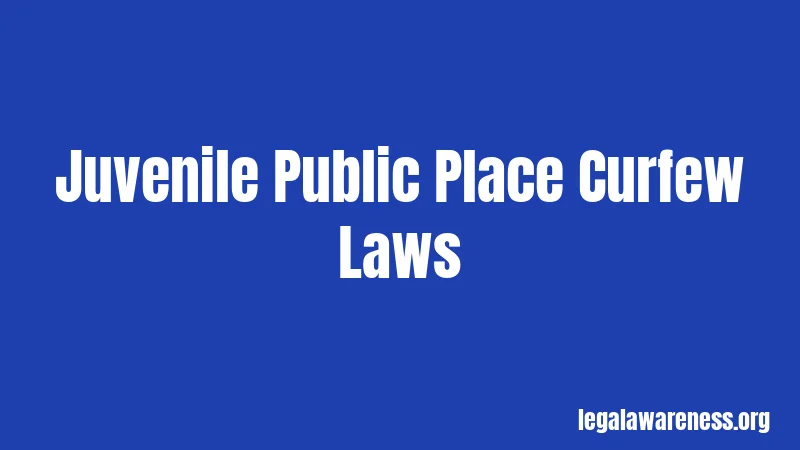Curfew Laws in Florida (2026): What You Need to Know
Florida has different types of curfew laws that affect young people. These laws help keep teens safe and reduce crime. Some curfews apply to driving. Others apply to being out in public places.
This guide explains Florida’s curfew laws in simple terms. You’ll learn when these laws apply and what happens if they’re broken.
What Are Curfew Laws?

Curfew laws limit when minors can be in certain places during specific hours. Florida has two main types of curfew laws.
The first type restricts teen driving during night hours. These laws are part of Florida’s graduated licensing system. They apply to all teen drivers statewide.
The second type restricts minors from being in public places late at night. These laws vary by city and county. Not all areas have these curfews.
Teen Driving Curfew Laws
Basic Driving Restrictions
Florida law sets specific driving hours for young drivers. The restrictions depend on the driver’s age and license type.
Drivers under 17 years old cannot drive between 11 p.m. and 6 a.m. unless they have a licensed adult age 21 or older with them. Drivers who are 17 years old cannot drive between 1 a.m. and 5 a.m. unless they have a licensed adult age 21 or older with them.
Learner’s Permit Rules
Teens with learner’s permits can only drive during daylight hours for the first three months. After three months, they can drive until 10 p.m.
A licensed driver who is 21 or older must always be in the front seat. This applies to all learner’s permit holders, even those over 18.
Exceptions to Driving Curfew
The driving curfew has two main exceptions. Teens can drive during restricted hours if they are traveling directly to or from work. They can also drive if a licensed adult age 21 or older is in the front passenger seat.
Teens should carry proof of employment when driving to or from work during curfew hours. This helps avoid complications if stopped by police.
New Teen Driver Education Requirements (2025)

Updated Training Requirements
Starting August 1, 2025, teens seeking a learner’s permit must complete a new six-hour Driver Education Traffic Safety (DETS) course. This replaced the old four-hour TLSAE course for applicants under 18.
Teens who completed the TLSAE course before August 1, 2025, can still use their certificate. The certificate must be used within one year of completion.
What the DETS Course Covers
The new course teaches more comprehensive driving skills. Students learn about traffic laws, defensive driving, and handling peer pressure. The course also covers Florida weather conditions and interactions with law enforcement.
Students can take the course online or in person. The course can be taken through Florida Virtual School or other approved providers.
Penalties for Driving Curfew Violations
First-Time Violations
Teens caught driving during restricted hours typically receive a traffic citation and fine ranging from $50 to $100. The exact amount varies by county.
More importantly, the violation goes on the teen’s driving record. This can affect insurance rates and result in higher premiums.
Repeat Violations
Multiple violations can lead to higher fines, mandatory driver improvement courses, and potential license suspension. Crashes during curfew hours can result in suspension and added liability.
License Suspension Rules
If a teen gets six points on their driving record within 12 months, their license is automatically restricted to “Business Purposes Only” for 12 months or until age 18. Additional points extend the restriction by 90 days each.
Juvenile Public Place Curfew Laws

State Model Law
Florida provides a model curfew law for cities and counties to adopt. The model law prohibits minors under 16 from being in public places between 11 p.m. and 5 a.m. Sunday through Thursday. On weekends, the curfew runs from 12:01 a.m. to 6 a.m. on Saturdays, Sundays, and legal holidays.
Local Variations
Cities and counties can adopt their own curfew rules. Local governments can make curfews more or less strict than the state model. Not all areas in Florida have juvenile curfew ordinances.
Miami-Dade County has a curfew for anyone under 17 between 11 p.m. and 6 a.m. Sunday through Thursday, and midnight to 6 a.m. on weekends.
School Hours Restrictions
Minors who are suspended or expelled from school cannot be in public places between 9 a.m. and 2 p.m. on school days. This helps ensure students attend school regularly.
Penalties for Public Place Curfew Violations
First Violation
First-time violators typically receive a written warning. Police will contact parents to pick up the minor.
Subsequent Violations
Second and later violations are charged as civil infractions with a $50 fine for each violation. In Miami-Dade County, after three violations, parents may face a fine up to $500.
Police Procedures
When a minor violates curfew, they are taken to a police station or approved facility. Police try to contact parents within two hours. If parents can’t be reached or refuse to pick up the child, police may take the minor home or follow other legal procedures.
Exceptions to Juvenile Curfew
Most curfew ordinances include common exceptions. Minors can be out during curfew hours if they are:
- With a parent, guardian, or responsible adult over 21
- Going to or from work with proper documentation
- Attending a school, religious, or civic event
- Handling a family emergency
- Running an errand for their parents
Some areas require written permission from parents for certain activities. Check your local ordinance for specific requirements.
How to Comply with Curfew Laws
For Teen Drivers
Plan your schedule to avoid driving during restricted hours. Keep proof of employment if you need to drive to or from work. Always have a licensed adult over 21 with you if driving outside permitted hours.
Complete the required DETS course before applying for a learner’s permit. Make sure you understand your local driving restrictions.
For Parents
Know your local curfew laws. Some areas don’t have juvenile curfews, while others do. Understand that you may face fines if your child repeatedly violates curfew laws.
Set clear expectations with your teen about driving hours and curfew rules. Provide written permission when required for late-night activities.
Documentation to Carry
Teens should carry proper identification and any required permissions. Work schedules or letters from employers help prove legitimate travel during restricted hours.
Keep school enrollment documents if your area has daytime restrictions for suspended students.
Recent Changes and Updates
2025 Education Requirements
The biggest recent change affects teen driver education. Governor Ron DeSantis signed new requirements into law, making the six-hour DETS course mandatory for all applicants under 18 starting August 1, 2025.
This change aims to better prepare teen drivers for Florida’s roads. In 2023, teen drivers were involved in more than 44,600 crashes statewide, including 110 fatalities.
Why These Changes Matter
The fatal crash rate at night among teen drivers ages 16-19 is about three times higher than for adults ages 30-59. Better education and curfew restrictions help reduce these risks.
The new course requirements follow national best practices for teen driver safety.
Special Circumstances
Transfer Students
Teens moving to Florida from other states may have different requirements. Check with the Florida Department of Highway Safety and Motor Vehicles for transfer rules.
Military Families
Some areas provide exceptions for military families or teens involved in Civil Air Patrol activities. Check your local ordinance for military-related exceptions.
Emergency Situations
All curfew laws include exceptions for emergencies. If you’re helping with a family emergency or natural disaster, curfew restrictions typically don’t apply.
Document the emergency situation if possible. This helps if you’re stopped by police during restricted hours.
Frequently Asked Questions
What happens if my 16-year-old gets caught driving at midnight?
They will likely receive a traffic citation with a fine between $50-$100, and the violation will go on their driving record. This can increase insurance rates and lead to license restrictions if more violations occur.
Do all Florida cities have juvenile curfew laws?
No, cities and counties must adopt their own ordinances to enforce juvenile curfews. The state provides a model law, but local governments decide whether to use it.
Can my teen drive to work during curfew hours?
Yes, teens can drive directly to or from work during restricted hours. They should carry proof of employment like a work schedule or letter from their employer.
What’s the difference between the old TLSAE and new DETS course?
DETS is a six-hour course that covers more comprehensive driving skills, while TLSAE was only four hours. DETS dives deeper into traffic laws, responsible decision-making, and real-life consequences of risky driving.
Can parents be fined for their child’s curfew violations?
Yes, in some counties, parents can face fines after repeated violations. Miami-Dade County can fine parents up to $500 after a child’s third curfew citation.
Final Thoughts
Florida’s curfew laws exist to protect young people and keep communities safe. Teen driving restrictions help new drivers gain experience gradually. Juvenile curfews reduce late-night crime and victimization.
Understanding these laws helps families avoid violations and penalties. The new 2025 education requirements show Florida’s commitment to improving teen driver safety.
Remember that curfew laws vary by location. Check your city and county websites for local ordinances. When in doubt, contact your local police department for clarification.
Following curfew laws protects your teen and your family from legal and financial consequences. These restrictions are temporary and end when teens reach 18 years old.
